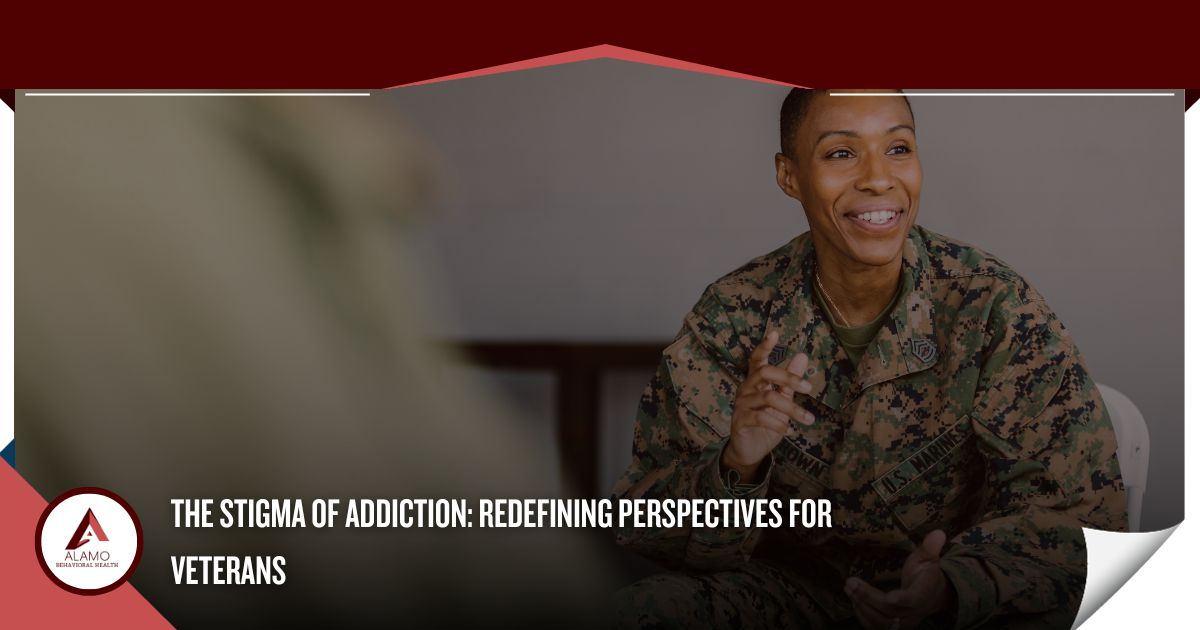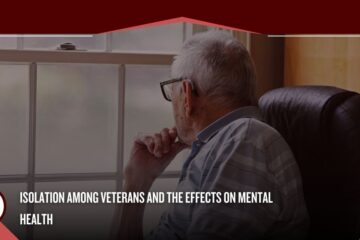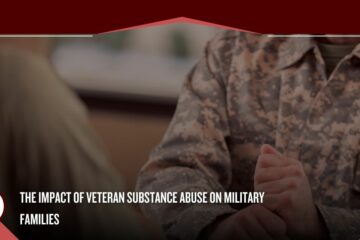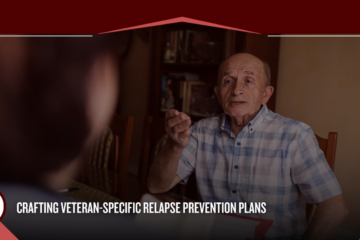 Veterans are at a high risk for substance abuse because of the lasting effects of being in the military. According to the Substance Abuse and Mental Health Services Administration (SAMHSA), 2.7 million veterans struggled with addiction in 2020, with 70% of them suffering from alcoholism.[1]
Veterans are at a high risk for substance abuse because of the lasting effects of being in the military. According to the Substance Abuse and Mental Health Services Administration (SAMHSA), 2.7 million veterans struggled with addiction in 2020, with 70% of them suffering from alcoholism.[1]
While addiction is prevalent among veterans, there is a stigma associated with substance abuse that prevents them from getting the help they need. For example, other veterans might call them weak or say they have a lack of willpower if they express needing support for their addiction. Because these stigmas can prevent people from receiving the treatment they need to recover, it’s important to learn how to combat and overcome them.
Instead of viewing addiction as a lack of morals or a sign of weakness, it is a sign that someone needs extra support. Additionally, rather than trying to shame a veteran into recovery from drug and alcohol abuse, it’s important to help them compassionately gain access to professional treatment.
What Kinds of Stigmas Affect Veterans With Addiction?
Unfortunately, addiction is common among veterans. Since substance abuse is so prevalent, you’d think that attitudes surrounding addiction would lean towards compassion, however, many people still believe in common misconceptions, spreading stigma instead of support.
Understanding the stigma surrounding addiction can help you redefine your perspectives. Common stigmas associated with addiction among veterans include:
The Misconception of “Lacking Willpower”
Many people believe that individuals who suffer from addiction are just lacking the willpower necessary to stop abusing drugs and alcohol. However, this is far from the truth.
Many veterans struggling with addiction want nothing more than to stop abusing substances. Still, the physical and psychological dependence caused by their addiction is making it impossible for them to quit on their own.
Believing That Needing Help Makes You “Weak”
Many people who served in the military were taught to value strength, integrity, and determination above all else, so some view asking for help as a sign of weakness. Unfortunately, this belief prevents other veterans from asking for help when they are struggling with a substance use disorder, causing them to suffer from the long-term effects of addiction.
Instead of viewing asking for help as a sign of weakness, it’s important to acknowledge it as a strength. There is nothing stronger than being able to admit when you need assistance in overcoming something.
Fear of Judgement Leading to Isolation
Many people view drug and alcohol abuse as a sign of weakness, a moral failing, or an unappealing trait, so veterans struggling with addiction might begin to isolate themselves out of fear of being judged. Unfortunately, isolation from friends, family members, and fellow veterans can cause their addiction to begin to spiral out of control.
Rather than judging people for suffering from addiction, it’s essential to offer them support and let them know that support is available.
How Does Addiction Stigma Affect Veterans?
The stigma surrounding addiction can affect veterans in a variety of ways. The most obvious impact is that they will not seek the support they need to recover.
The addiction stigma can lead to the following issues among veterans:
- Emotional and psychological effects like depression, anxiety, and increased substance abuse
- A reluctance to seek treatment for addiction
- Lack of access to resources and support
- Relationship issues with friends, family members, and other veterans
- Internalization of negative beliefs
- Chronic health issues as a result of continued substance abuse
- Reduced quality of life
- Increased risk of suicide or overdose
When a veteran is dealing with addiction and the stigma attached to it, they may begin to suffer from mental health issues like depression and isolation. When you combine these issues, you get an increased risk of suicide. According to the Centers for Disease Control and Prevention (CDC), veterans have a suicide rate that is 57% higher than the general population.[2]
Creating a Supportive and Understanding Environment for Veterans in Recovery
Reducing the stigma associated with addiction among veterans can be complicated, however, there are a few easy things we can do to create a more supportive and understanding environment that allows them to ask for help when they need it.
Easy ways to combat the stigma surrounding addiction among veterans include:
- Public education and awareness projects for the general public and veterans
- Programs to encourage veterans to seek treatment
- Supporting veterans in your life who need help with addiction
- Community support groups for veterans who struggle with substance abuse
- Using compassion to address addiction rather than anger or misunderstanding
If you know a veteran who is struggling with addiction, the best thing you can do is let them know you are there for them and will help them find treatment when they are ready.
Get Connected to Addiction Treatment for Veterans
If you or a loved one is a veteran struggling with addiction, Alamo Behavioral Health is here to help. We provide individualized treatment planning to each of our clients to ensure that they receive services specific to their needs, whether that be trauma-informed care or medication-assisted treatment.
To learn more about our drug and alcohol rehab program for veterans, contact us today.
References:
- The Substance Abuse and Mental Health Services Administration (SAMHSA): 2020 National Survey on Drug Use and Health: Veteran Adults, Retrieved January 2024 From https://www.samhsa.gov/data/sites/default/files/reports/rpt37926/2020NSDUHVeteransSlides072222.pdf
- The Centers for Disease Control and Prevention (CDC): Disparities in Suicide, Retrieved January 2024 From https://www.cdc.gov/suicide/facts/disparities-in-suicide.html




